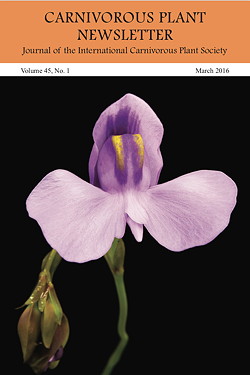International Carnivorous Plant Society
Carnivorous Plant Newsletter Archive
Olfactory prey attraction in Drosera?
Andreas Fleischmann
Carniv. Pl. Newslett. 45(1):19-25
Published 19 February 2016
https://doi.org/10.55360/cpn451.af483
Summary
The use of scented traps for prey attraction has been reported from a few genera of carnivorous plants: most prominently in the pitcher plant genera, where a sweet honey- or fruit-like scent is detectable to the human nose from the pitchers of some populations of Sarracenia flava, S. alata, S. rubra, S. oreophila, S. leucophylla, and S. minor, certain species of Heliamphora (a sweet, honey-like scent is produced from the nectar-spoons of H. tatei, H. neblinae, and H. chimantensis, while the pitchers of H. sarracenioides produce a notable chocolate-like odor when growing under natural or favorable conditions), and the pitchers of some species of Nepenthes. Interestingly, the Venus Flytrap Dionaea also has been discovered to attract prey to its traps not only by the vivid coloration, but also by producing scented volatiles.
Keywords: trap scent, prey attraction, prey analysis, Lepidoptera, ecology, Drosera fragrans, Drosera finlaysoniana, Drosera slackii
Article Citation
Andreas Fleischmann. 2016. Olfactory prey attraction in Drosera?. Carniv. Pl. Newslett. 45(1):19-25. https://doi.org/10.55360/cpn451.af483
Page views: 1265
©2025 International Carnivorous Plant Society
www.carnivorousplants.org
This page is maintained by John Brittnacher.
Please contact us at our membership website, icps.clubexpress.com.
Privacy: The Carnivorous Plant Newsletter Archive website does not track users.

